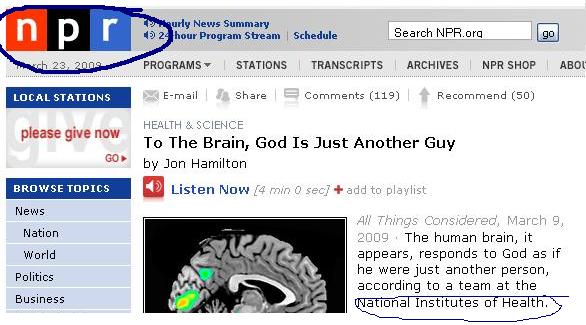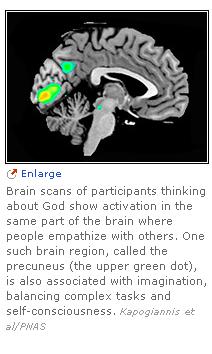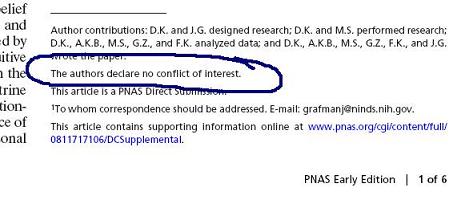March 24, 2009
To The Brain, God Is Just Another Guy

The most important question about any scientific study, that must be answered before any others are asked:
What do they want to be true?
Per NPR:

etc.
The study did make some interesting findings, but of course not the one heralded in the title or in the article.
The only true statement in the NPR article is this one:
NPR, and the study's author, unfortunately concluded more than this:
It's no stretch of the imagination to say that the majority of the NPR devotees-- and likely members of PNAS-- may not be outright atheists, but they're hardcore agnostics. They occupy that space preferred by the self-absorbed who aren't sure what they do believe, but fervently confident about what they don't believe: anything their parents were into. They're skeptical, but lazy; they "know" which things are not true, but can't be bothered to learn what is true, or at least make something up that is logically consistent. The exception to this is evolution: they are passionate about evolution, though woefully ignorant of any of its principles or mechanisms. Their zeal is partly in reaction to established religion, and evolution becomes a substitute for religion.
Articles like this one fortify them. They don't need the details; it's enough to know that science is discovering, bit by bit, that much of the intellectual or religious history of mankind over the past, say, 6000 years, is all crap. It only took the sophisticated, post-Nixon mind to figure out what Kant couldn't. "Whatever, man-- evolution has a billion years on you." Indeed.
The study itself isn't too hard to explain. Subjects were asked to agree or disagree with certain god related statements ("People go to hell," "God protects all people") while their brain was scanned. The study found that the same regions were ones associated with understanding the intentions and emotions of human beings. Ergo: God is just another guy.
The obvious criticism is that this didn't study the religions experience at all; what it studied was what regions of the brain interpret statements that relate to intention. If they asked, "Jabba The Hutt thinks Leia is hot" it would have lit up the same regions, allowing the title of this article to be, "To The Brain, God Is Just Another Hutt."
Furthermore, it is very likely that many of these regions are only involved in linguisitic interpretations; if they had shown videos of people intending to do something, different regions of the brain would have been used.
But a more subtle criticism, and likely the most relevant one, is that this study was done on Americans born after 1970-- the Dumbest Generation of Narcissists In The History Of The World. Even if this was a valid test of how the brain deals with the religious experience, it's probably not applicable to how human beings in general, or over time, deal with the religious experience. If they tested, say, Carmelite nuns "thinking about God," you'd probably get different regions. (They did.)
In other words, the study emphatically does not show that "to the brain, God is just another guy." At best, it shows that American 30-somethings are not able to see God as anything other than just another guy; but who knows how 3rd century Romans saw God? Given that the study was done at NIH, by cognitive neuroscientists, published in PNAS and then reported on NPR, you would think that someone would have thought of this. Or perhaps they did, which is why they wrote it this way.


etc.
The study did make some interesting findings, but of course not the one heralded in the title or in the article.
The only true statement in the NPR article is this one:
A study of 40 people -- some religious, some nonreligious -- found that phrases such as "I believe God is with me throughout the day and watches over me" lit up the same areas of the brain we use to decipher the emotions and intentions of other people.
NPR, and the study's author, unfortunately concluded more than this:
Grafman says the finding, published in the Proceedings of the National Academy of Sciences, shows that there is no special circuitry in the brain that deals with religious belief. It also suggests that religion developed as the human brain evolved its capacity for complex social interactions.Nope.
It's no stretch of the imagination to say that the majority of the NPR devotees-- and likely members of PNAS-- may not be outright atheists, but they're hardcore agnostics. They occupy that space preferred by the self-absorbed who aren't sure what they do believe, but fervently confident about what they don't believe: anything their parents were into. They're skeptical, but lazy; they "know" which things are not true, but can't be bothered to learn what is true, or at least make something up that is logically consistent. The exception to this is evolution: they are passionate about evolution, though woefully ignorant of any of its principles or mechanisms. Their zeal is partly in reaction to established religion, and evolution becomes a substitute for religion.
Articles like this one fortify them. They don't need the details; it's enough to know that science is discovering, bit by bit, that much of the intellectual or religious history of mankind over the past, say, 6000 years, is all crap. It only took the sophisticated, post-Nixon mind to figure out what Kant couldn't. "Whatever, man-- evolution has a billion years on you." Indeed.
The study itself isn't too hard to explain. Subjects were asked to agree or disagree with certain god related statements ("People go to hell," "God protects all people") while their brain was scanned. The study found that the same regions were ones associated with understanding the intentions and emotions of human beings. Ergo: God is just another guy.
The obvious criticism is that this didn't study the religions experience at all; what it studied was what regions of the brain interpret statements that relate to intention. If they asked, "Jabba The Hutt thinks Leia is hot" it would have lit up the same regions, allowing the title of this article to be, "To The Brain, God Is Just Another Hutt."
Furthermore, it is very likely that many of these regions are only involved in linguisitic interpretations; if they had shown videos of people intending to do something, different regions of the brain would have been used.
But a more subtle criticism, and likely the most relevant one, is that this study was done on Americans born after 1970-- the Dumbest Generation of Narcissists In The History Of The World. Even if this was a valid test of how the brain deals with the religious experience, it's probably not applicable to how human beings in general, or over time, deal with the religious experience. If they tested, say, Carmelite nuns "thinking about God," you'd probably get different regions. (They did.)
In other words, the study emphatically does not show that "to the brain, God is just another guy." At best, it shows that American 30-somethings are not able to see God as anything other than just another guy; but who knows how 3rd century Romans saw God? Given that the study was done at NIH, by cognitive neuroscientists, published in PNAS and then reported on NPR, you would think that someone would have thought of this. Or perhaps they did, which is why they wrote it this way.

Of course not.
26 Comments